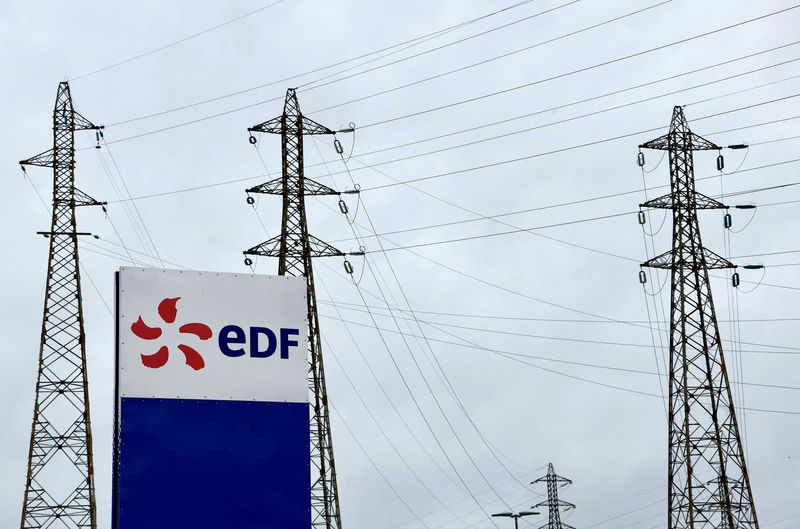PARIS, Feb 15 (Reuters) – Falling electricity prices are
slowing EDF’s negotiations with industrial customers for
long-term contracts, four sources and experts say, threatening
the debt-laden energy group’s long-term finances and ability to
keep its aging nuclear plants running.
Financial results for 2023 on Friday will likely show
progress in cutting some of EDF’s 65 billion euros ($69.5
billion) of debt and a rise in profits bolstered by soaring
power prices following Russia’s invasion of Ukraine in 2022.
But the lack of forward deals will renew concerns about the
state-owned power company’s long-term commercial outlook after
its nationalisation last June. EDF needs those deals to shore up
its finances and reduce risks of price swings so it can invest
to extend the life of its 56 nuclear reactors and build at least
six more.
A power price deal EDF agreed with the government in
November aims to stabilise electricity prices for retail and
industrial customers at 70 euros per megawatt-hour (MWh) on
average from 2026 when current contracts expire. The current
breakeven level for production costs is 60 euros/MWh.
But sinking prices are undermining that strategy.
The drop in prices is “seriously disrupting both the market
and EDF”, said one EDF source who declined to be identified
because the talks are private. He described the market as being
in a “real paralysis” because both sides are in a wait-and-see
mode.
An absence of deals could make it harder for EDF to secure
funding or hurt its credit ratings. Top agencies Fitch, S&P and
Moody’s have lower-medium grade ratings for its long-term debt.
“We’ll closely monitor how the amount of long-term contracts
picks up over time,” Antonio Totaro, Fitch’s head of EMEA
utilities and transport, said.
Aluminium producer ArcelorMittal signed a letter of intent
for an electricity production allocation contract with EDF in
mid-January. EDF declined to comment on the progress of any
talks.
HOLDING OUT
EDF and customers have blamed each other for the slow pace
of talks.
The EDF source said it “makes no sense” for customers to
book far forward contracts while prices are trending downwards.
Yet EDF could also be stalling, hoping that prices stabilise
above current levels.
Industrial customers are ready to sign deals, Nicolas de
Warren, president of Union of Energy Using Industries (Uniden)
said.
“Things are not moving fast enough,” he said. Uniden
represents about 70% of France’s industrial energy users, such
as Renault and train operator SNCF.
Uncertainty over future prices is slowing investment
decisions for energy-intensive industries even as the government
aims to reindustrialize France while reducing carbon emissions,
he said.
“These industries cannot live with increasing market price
variability, so we absolutely need these contracts,” de Warren
said.
While the scheme is off to a bad start, there is no
alternative currently on the table, the EDF source said. EDF and
the government said last year they plan to review its success
around May.
An alternative to the November plan could be to set a
floor price for nuclear electricity sold by EDF, through a
“contract for difference” scheme for example, which would
require approval from Brussels.
BREAKEVEN
The French baseload contract for 2026 has more
than halved over the past year, piercing the 70 euro/MWh level
on Feb. 5 that was set as the market reform reference price. On
Wednesday, it hit a fresh contract low of 63.75 euros/MWh.
Front-year contracts traded around 50 to 60
euros from 2018 before spiking in 2022 after Russia’s invasion
of Ukraine when they peaked at 1,200 euros/MWh. They have fallen
rapidly over the last year and are now at around 70 euros/MWh.
EDF’s other new pricing strategy, aimed at setting rates to
sell to rivals such as Engie and TotalEnergies
, includes auctions for 2028 and 2029 contracts.
Demand has been lacklustre for those too.
Out of 54 total auctions since the start of the year, only a
dozen have been successful and at prices below 70 euros, EDF
data showed.
“The relatively low level of participation shows a limited
interest on the part of the French market for this type of
product, probably due to EDF’s reserve prices, which might be
considered too high,” said ICIS analyst Lucca Urbanucci.
The French economy ministry said it has no plans to help the
group if power prices fall below the 60 euros per megawatt-hour
(MWh) breakeven level. It reiterated this month that market
reform agreed in November will help EDF manage price volatility
and invest in assets.
($1 = 0.9344 euros)
(Reporting by Forrest Crellin and Benjamin Mallet;
Editing by Josephine Mason and Elaine Hardcastle)
